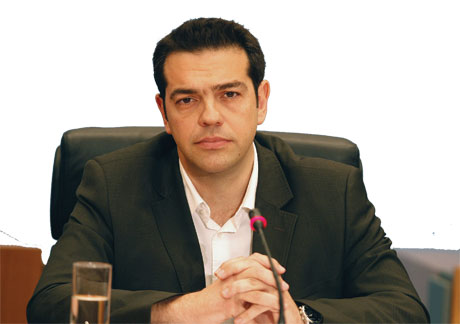
ATHENS – Prime Minister Alexis Tsipras declared a win on Saturday in Greece’s battle over its bailout but warned his fellow Greeks that difficult negotiations lie ahead.
“We won a battle, but not the war,” he said in a televised address. “Difficulties still lie ahead of us.”
A mixture of relief and a sense of deja vu greeted an agreement in Greece that Tsipras’ leftist-led government reached Friday with its eurozone partners to extend the country’s bailout.
“The worst has been avoided, and that is positive,” said the conservative New Democracy party, which had led the previous government before losing January elections to Tsipras’ Syriza party amid a backlash over its austerity measures.
But the now-opposition party asserted that the actions of the government in recent days has placed cash-strapped Greece under stronger control of its creditors.
“Alexis Tsipras to be sure chose at the end to take the path of logic,” the moderate, pro-European To Potami party said. “The nightmare scenario of an exit from the eurozone has been averted for the time being.”
The agreement, made days before the European part of the country’s financial lifeline expires, extends Greece’s bailout by four months on the condition that its leaders approve new reforms. Greece thereby avoided insolvency.
But not everyone in Athens was persuaded that the extension could be sold to the Greek people as a different deal to the old one.
- Chamisa under fire over US$120K donation
- Mavhunga puts DeMbare into Chibuku quarterfinals
- Pension funds bet on Cabora Bassa oilfields
- Councils defy govt fire tender directive
Keep Reading
“The Greek government not only made major concessions, but it essentially nullified the major election pledges by Syriza,” said economics professor Aristides Hatzis of the University of Athens. “It will be very difficult to sell this to the Greek people.”
Syriza could face turmoil from its own more radical leftist factions, who will see the extension as a sell-out, he predicted.
“The new bailout agreement will look so similar to the old one by the autumn that everyone will then realize what happened in its fullest extent,” he said.
The government insisted the country has turned a page and finally put an end to the so-called troika of Greece’s international lenders, made up of the European Commission, the European Central Bank and the International Monetary Fund.
“Yesterday we made an important step, leaving behind austerity, the memorandum and the troika,” Tsipras insisted.
He said the “government cancelled any plans to cause asphyxiation to Greece on February 28.”
Tsipras’ government had taken a hard line in negotiations with its European partners after promising to roll back austerity policies agreed by previous governments in return for debt-ridden Greece’s ₣240 billion ($274 billion) in bailouts.
But as a February 28 deadline approached for the European financial taps to be turned off, Greece agreed to provide clear reform commitments to secure the bailout extension of its bailout.
The Communist Party criticised the agreement in Brussels as nothing more than a continuation of the old austerity programme while the socialist Pasok party acknowledged that Tsipras’ government had a gun to its head.
“The end of the illusions (for Tsipras’ government) has come,” it said, adding that had it not faced reality, it would have set the country back years.
Athens now has until Monday to submit details of the measures it plans to undertake, and Finance Minister Gianis Varoufakis promised to work “day and night” on the reform plan.

Its creditors will assess whether they are in line with Greece’s bailout commitments before eurozone members formally agree on the extension by the February 28 deadline.
A handful of countries, including fiscally conservative Germany and Finland, must seek parliamentary approval for the bailout extension.
Athens taxi driver Tomas Georgiou (31) was pragmatic about the agreement: “Certainly the government had to give in on a number of promises, but that goes with any negotiation.
At least we are off to a good start and they will refrain from cutting pensions more and increasing the VAT tax on businesses for the Greek islands.”
Hatzis predicted the government’s first draft of reforms will include “big words” like fighting corruption and tax evasion “with few references to pro-market reforms”.
But under pressure from Greece’s international partners, he said he expected the final list to include measures such as deregulation, privatizations and social security reforms.
“I hope that, across the board, cuts and tax hikes won’t reappear,” he said. – Fin24










